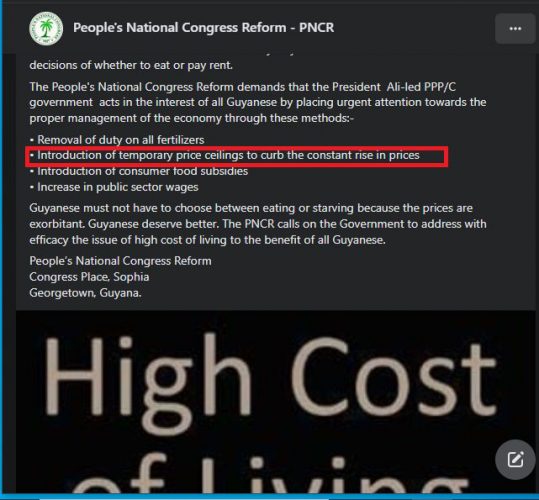Just over 24 hours after his party issued a call for the “Introduction of temporary price ceilings to curb the constant rise in prices and introduction of consumer food subsidies” to address the rising cost of living in Guyana, Leader of the People’s National Congress Reform (PNCR) Aubrey Norton said that he was not aware of the position.
Norton was asked at the party’s weekly press conference yesterday to elaborate on the call for the introduction of temporary price ceilings as a mitigation measure in response to the rising prices of food.

“I am not clear but today’s press statement outlines clearly our position on this high cost of living. I am not knowledgeable of us wanting any price ceilings etc. If you’re talking about price controls, they don’t work. If you check the world, they don’t work and I don’t know exactly what you’re referring to but the PNCR is not interested in price controls,” he said in response to questions about the call.
However, as of 6 pm yesterday, the statement calling for price ceilings and other measures were still posted to the PNCR’s Facebook page.
Norton added that the party is interested in the government taking proper measures to reduce the cost of living.
Reading from a prepared statement at his press conference yesterday, Norton said that with Guyana booming as one of the youngest oil economies the “meagre 7% increase in the minimum wage” coupled with the cost of everyday items increasing by over 20% in the last year, all points to the warning signs of the resource curse.
“…Guyana is already suffering from the dreaded resource curse – also known as the paradox of plenty. It is the failure of the country to benefit from its natural-resource wealth and the failure of the government to respond effectively to public welfare needs – instead of reaping the benefits of much anticipated economic transformation,” the PNCR leader said.
He accused the government of continued mismanagement of the economy and showing very little care in relation to improving the lives of the most vulnerable.
“With the World Bank projecting real growth of 49.7% in 2022 and with the government expected to raid the Natural Resource Fund (NRF) of the entire sum of US$607 million (G$122 billion), under the disputed and highly contentious NRF Act 2021, the PNCR calls upon the government to craft a Budget 2022 that will bring relief to the Guyanese people and transform their lives in a meaningful way,” Norton urged.
He added that budget 2022 should be people-centred as opposed to focusing on the needs of the private sector. The PPP/C government has been constantly accused of catering to the needs of the private sector by including a slew of measures in their budgets that benefits the business community and leave the ordinary citizens out.
Norton called on the government to increase the income tax threshold to $1.5 million or 1/3 of gross earnings as part of budget 2022 and to change the income tax law to ensure that the minimum wage is never taxed.
Norton also urged an interim increase in wages and salaries of public servants of 10% pending the start and finalization of government/union talks on wages and other benefits for workers. “At the end of the day, workers must get at least 25% in wages and salaries increase,” he said.
He also called for an increase of $10,000 per month in the old-age pension and the grant given to those in difficult circumstances as well as the payment of a COVID Risk Allowance to all eligible frontline workers of $50,000 every 6 months until the pandemic has been declared officially to be over by WHO/PAHO.
Additionally, Norton said the government should cater for grants to start-ups, micro, small and medium businesses of up to $5 million while setting aside approximately $5 billion for the implementation of a programme of infrastructure renewal in depressed villages and communities.
He also called for an immediate poverty survey across Guyana.
The Bureau of Statistics published its last Consumer Price Index for November 2021, where it showed that food prices have steadily increased with a slight dip for November.
The Food and Agriculture Organisation (FAO) Food Price Index reached a 10-year high in 2021, despite a small December decline, the Organisation said. The FAO Food Price Index (FFPI) averaged 133.7 points in December 2021, down 1.2 points (0.9%) from November, but still up 25.1 points (23.1 %) from December 2020.
“Except for dairy, the values of all sub-indices encompassed by the FFPI registered monthly declines, with international prices of vegetable oils and sugar falling significantly month-on-month. For 2021 as a whole, the FFPI averaged 125.7 points, as much as 27.6 points (28.1 %) above the previous year with all sub-indices averaging sharply higher than in the previous year,” the FAO said in a recent report.
Persons have been calling for the government to step in and do something to cushion the effect of rising food prices and global inflation.






